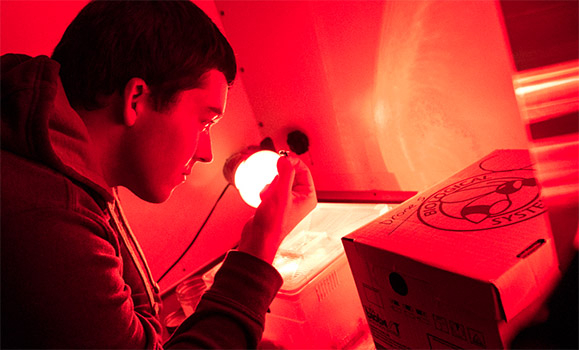Inspired by an Entomology class taught by Chris Cutler, fourth-year Environmental Science student Sawyer Olmstead has uncovered a passion for bees.
“Bees are so important for pollination, but I envy how they can all work so well together as a group to achieve a common goal,” says Sawyer. “Bees understand the concept and sometimes people don't.”
Drawn to the Faculty of Agriculture because of his farming background and love of soil Sawyer soon found himself drawn to these powerful insects.
“I think a lot of people have a natural attraction to bees once they start learning about them, simply because they are fascinating,” explained Dr. Cutler, associate professor in the Department of Environmental Sciences, Faculty of Agriculture.
Community connections
A native of Truro, Sawyer was recently asked to take part in an international research project with the Organization for Economic Cooperation Development (OECD). OECD is an international cooperative effort that is attempting to determine toxicity standards for bumblebees. The tests were conducted in numerous labs across the globe, Dr. Cutler’s lab being one, which allowed Sawyer to conduct his research in Bible Hill.
“A lot of research has been done in insect toxicology and the effects of pesticides on bees and honey bees, because they are more common,” Sawyer explains. “Everyone loves honeybees. No one has really looked at bumblebees or other bees that are not in the honeybee family."Â
Sawyer is taking his research a step further by studying to see if low doses of pesticides can influence the longevity or survival of bumblebees which would be a beneficial response to pesticide.
“High doses can kill them, but it is starting to be observed that in some instances [that] low doses of pesticides can have beneficial effects on some insects such as increased fertility or improving the overall fitness of the insect.” As part of this project, Sawyer has to be in the lab daily, checking the results of his testing for 21 consecutive days.

Sawyer learned a lot from simply working and being on the Agricultural Campus. He gained knowledge on bees and beekeeping and was able to overcome and enjoy the challenges of beekeeping.
Sawyer has also woven his beekeeping into his family farm. “I have eight hives of my own and hope to have 20 by next fall. I plan to rent them out for pollination and grow it into a small business,” Sawyer added. “I incorporated them into the farm since they are important in an agricultural system. All livestock works together.”
Further research
After having the opportunity to work with OECD through pilipiliÂţ», Sawyer plans to return to the Faculty of Agriculture in September to complete his master’s degree under the supervision of Dr. Cutler.
“Sawyer is a very bright guy, he did very well in my entomology class,” Dr. Cutler added. “Sawyer loves farming, the outdoors and nature in general.”
With graduation, commencement of his master’s degree, a budding business and much more in store in the coming years, Sawyer’s future is looking sweet as honey.

